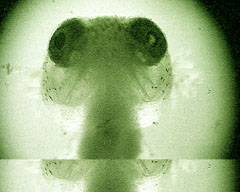Nascut el 5 de Març de 1966 a Vitòria-Gasteiz (País Basc). Viu i treballa entre París, Estrasburg i Auberive (França). Professor a l'ESAD d'Estrasburg des de 1999.
Fràgils arquitectures a habitar
Francisco Ruiz de Infante pertany a una generació d'artistes que la sensibilitat està marcada per la trobada i la confrontació de la tecnologia amb altres materials molt simples. En les seves obres combina, sense complexos, dispositius tecnològics i bricolatge d'urgència. Gairebé sempre efímeres, les seves construccions són el resultat d'una experiència "in situ" portada al límit. Elles són creades, al voltant, per, amb i en el lloc que les provoquen.
En la seva concepció de l'espai expositiu, la noció de "recorregut" o de circuit és predominant. Així doncs, elabora passatges, camins, túnels, portes ...: rituals físics d'accés cap a les seves "fràgils arquitectures" a mig camí entre la construcció i la ruïna.
Complexos acceleradors de l'inconscient (recorreguts i jocs de pistes)
Els "recorreguts per experimentar" que proposa i el desequilibri que generen, constitueixen de vegades una "trampa" fabricada per submergir l'espectador en el qüestionament de la seva pròpia realitat perceptiva. Francisco Ruiz de Infante reconstrueix alguns modes del funcionament de la memòria al ser activada en el present: en forma de potents impulsos plens d'errors d'informació o com un torrent d'imatges que tornen a començar sense fi. Les seves instal·lacions audiovisuals són complexos acceleradors de l'inconscient.
Les referències al món de la infància són recurrents en tota la seva obra. La infància o millor dit els passatges Infància / adolescència / estat adult, han recorregut (i recorren) els seus diferents projectes fent-nos entrar en espais en els quals l’ "estrany quotidià" es fa evident (llocs per a l'aprenentatge, decorats de festes a mig desmuntar , sales de jocs sense regles en què ningú juga, amenaçadors cabanes infantils, desequilibrats jocs de construcció a escala un, jocs de pistes sense lògica evident, espais audiovisuals de violència absurda ...)
Límits entre realitat i ficció (aprenentatge, educació i risc)
La seva revisió i anàlisi d'aquestes etapes "en formació" de la vida humana, presenten temàticament alguns perills de la "educació-modelització" i la seva deformació-desenvolupament en la societat adulta (societat altament "infantilitzant" en el context actual, en què la remor dels mitjans dicta de manera irresponsable el ritme del pensament col·lectiu).
En passejar dins les seves instal·lacions, és possible trobar al·lusions directes a les maneres de construcció del període, sense normes jeràrquiques, de la infància. En la seva obra la problemàtica de l'escala, de la cosa inacabada, del lloc ocult, de la complexitat extrema en espais ineficaços, de simetria inexacta, del desordre altament sofisticat ... es transforma en una cosa perillosa i inquietant.
Dins d'aquesta "acceleració" generada per una acumulació d'elements sensorials i conceptuals en les seves obres, Ruiz de Infante ens confronta a l'absurd i terrible d'alguns comportaments massa automàtics a causa de les regles socials adultes. Amb l'ajuda d'obstacles i frens als moviments lliures de l'espectador, qüestiona la noció de "el prohibit" a la societat "risc zero" que algunes ideologies volen vendre'ns; aquesta societat que confon sovint "participació" i "manipulació"; "Bona educació" i "absència de curiositat". Els seus dispositius ens mostren (de vegades de forma extremadament física) que la vida és un assumpte de risc i que hem d'estar sempre alerta.
Infància i estats transitoris
"... És veritat que la meva visió del món de la infància està marcada pel seu caràcter tèrbol. En ell, les lleis socials no han estat integrades i les accepcions de la noció de "prohibit" són percebudes com una cosa absurda.
És cert que el nen és sovint considerat com a model perfecte d'innocència ... però els nens són llavors l'adult que encara no ha comprès completament l'ecosistema social en el qual els ha tocat desenvolupar-se. Evidentment, "la comprensió" del món del que és "real" es farà progressivament a través de l'aprenentatge de les regles que ordenen les relacions socials en cada context: l'educació científica, cultural, moral i ètica s'encarregarà d'això. L'assimilació del llenguatge i els codis d'una comunitat, permetran més tard l'acceptació, la submissió o la rebel·lió adulta.
Una cosa que em fascina (com a artista i com a ésser humà) és la llibertat dels mecanismes de percepció de la infància i l'ús imprecís d'algunes regles només intuïdes. Això genera interessants (i perillosos) disfuncionaments socials, molt difícils de jutjar des d'una òptica moral. En molts dels meus treballs, intento descontextualitzar alguns d'aquests mecanismes per així comprendre millor (i relativitzar) la nostra llibertat adulta. "
La comprensió i el qüestionament d’allò prohibit
Amb els meus últims "dispositius" busco provocar el dubte perceptiu de l'espectador; vull empènyer cap a una reflexió que interroga el fonament de les regles o normes (de vegades explicitades en el projecte mitjançant l'escriptura de "manuals d'instruccions"). D'aquesta manera, algunes qüestions simples apareixen de manera clara: Es pot passar?, es pot tocar? Es pot parlar? Està permès seure?
(...) En les meves instal·lacions recents s'entra com qui penetra en una sala de jocs inquietant, o com ho faria un nen que explora un lloc intentant espantar-se a si mateix. El joc al qual voldria convidar a l'espectador, pot fer-li relliscar cap al joc prohibit l'adult: aquest que barreja conscientment realitat i ficció.
La construcció i anàlisi d'ecosistemes (En els quals les nocions d'intrús, catàstrofe, transformació i / o evolució són tingudes en compte). Avui en el meu treball, voldria que les percepcions físiques i inconscients -accentuades per la sospita d'un perill- poguessin batre juntament amb la percepció més intel·lectualitzada de l'acte artístic sense que per això l'equilibri complex de la percepció es trenqui. És per això que les meves instal·lacions cobren plenament sentit a través de l'experiència i el contacte directe: autor, lloc, obra, espectador, autor ...
A l'interior d'aquests "sistemes", les reaccions dels "visitants" constitueixen un camp de reflexió intens per avançar en cada nova proposició d'una manera inesperada.
